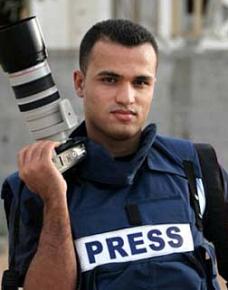Palestinian journalist detained
By
AN AWARD-winning independent journalist whose dispatches from Gaza have cast a spotlight on the misery endured by its more than 1.5 million Palestinian residents was attacked and abused by Israeli security as he tried to return to his home.
Mohammed Omer was returning from the awards ceremony in Britain for the 2008 Martha Gellhorn Prize for Journalism--which Omer shared with author Dahr Jamail--and several speaking engagements and meetings in Europe.
He crossed the Jordanian border at Amman but was detained by Israeli border officials, who claimed he didn't have permission to travel to his home in Rafah, in southern Gaza. Several hours into his detention, Omer's interrogation by Israeli security turned violent--to the extent that he was taken to a hospital when the agents were done with him.
Omer writes for numerous publications and maintains the blog Rafah Today. His articles have been an indispensable source of information on Gaza as the Israeli military has tightened its iron grip. For example, earlier this year, when residents breached Gaza's border wall and streamed into Egypt in defiance of the blockade, Omer described the scene for Socialist Worker and other publications.

Omer's treatment at the hands of Israeli soldiers "is reflective of the racist, ignorant, fear-based mentality of the Zionist movement," said Dahr Jamail, author of Beyond the Green Zone: Dispatches From an Unembedded Journalist in Occupied Iraq. "The ongoing daily violations of international law and simple humanitarian ethics by the occupiers of Palestine are sowing the seeds of continued violence, hatred, mistrust and unrest in the region for generations.
When Omer reached the Israeli side of the border between Jordan and the West Bank, he was detained and held in a small room until the Shin Bet intelligence services arrived.
"His luggage was again searched, and security then proceeded to go through every document and paper he had on him, taking down the names and numbers of the European parliamentary officials he had met," the Inter Press Service (IPS)--which publishes Omer's dispatches--reported. "The Shin Bet officials then started to make fun of the European parliamentarians, and mocked Omer for being 'the prize-winning journalist.'
"The Gazan journalist was repeatedly asked why he was returning to 'the hell of Gaza after we allowed you to leave.' To this, he responded that he wanted to be a voice for the voiceless. He was told he was a 'troublemaker.'"
Omer was then harassed about the money he received for winning the Gellhorn Prize. He said he wasn't carrying the full sum with him, but the Israeli agents ordered him to strip naked and began searching him.
"At this point," the IPS reported, "Omer broke down and pleaded for an end to such treatment. He said he was told, 'You haven't seen anything yet.' Every cavity of his body was searched as one of the investigators pinned him down on the floor, placing his boot on Omer's neck. Omer began vomiting, and fainted.
"When he came round his eyelids were being forcibly opened and his eardrums probed by an Israeli military doctor, who was also armed. He was then dragged along the floor by his feet by the Shin Bet officials, with his head repeatedly banging on the floor, to a Palestinian ambulance which had been called."
Omer said he "eventually woke up in a Palestinian hospital with the doctors trying to reassure me." Several days after the event, he said he was still "struggling to breathe and [had] pain in my head and stomach."
"The abuse of Mohammed Omer by Israeli security agents is appalling," said Anthony Arnove, author of Iraq: The Logic of Withdrawal. "It reflects a widespread targeting of journalists and truth-tellers, who challenge the image Israel presents to the world by documenting the reality of Israel brutality and racism against the Palestinians.
"At the same time, Omer's case isn't unique. Every day, countless such abuses take place. While Omer was no doubt targeted as a journalist--and as part of a broader U.S. and Israeli campaign against media workers in the Middle East that has claimed many lives--his treatment reflects the daily abuse of Palestinians who seek to go to work, visit their families, receive medical care and who have to cross the hundreds of checkpoints, borders, walls and Jewish-only roads constructed by Israel to divide and suppress the Palestinians, denying them fundamental human rights."


